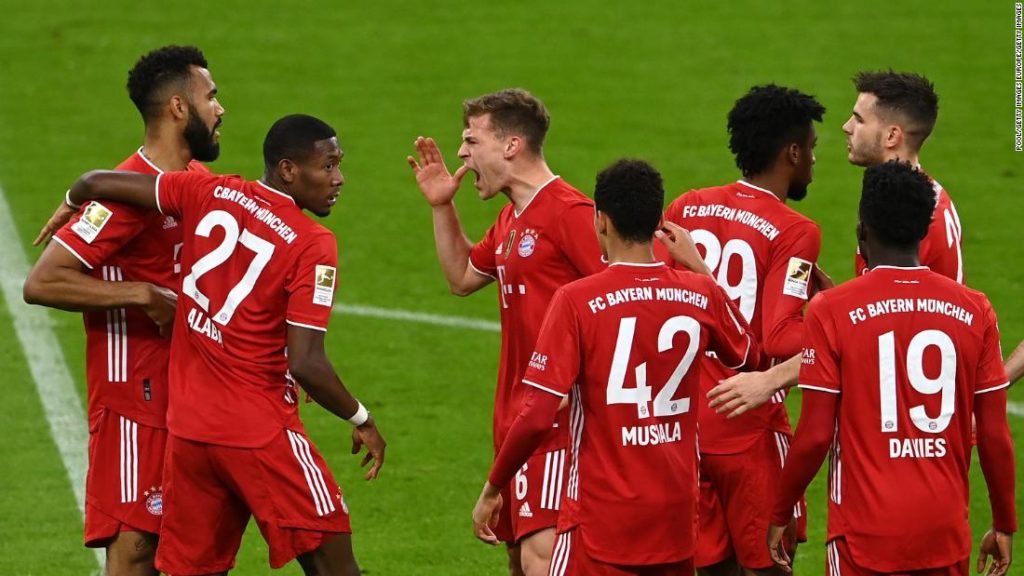
The German side secured its ninth consecutive Bundesliga title on Saturday, after second place RB Leipzig — the only side still able to mathematically catch Bayern — fell to a 3-2 defeat away to Borussia Dortmund.
Despite wrapping up yet another crown before taking to the pitch, there was was no sign of complacency as Bayern routed Borussia Mönchengladbach 6-0 to put the icing on the cake.
At points during the season, it looked as though this year’s title race might not be the foregone conclusion that many had understandably predicted. However, as is so often the case, Bayern finished the season in imperious form, losing just once in its last 16 matches to clinch the title with three games to spare.
That run of form was all the more impressive given star striker Robert Lewandowski was sidelined for almost a month with an ankle injury, only returning to the side during the last round of fixtures on April 24.
The team also had to deal with the news that much loved head coach Hans-Dieter Flick would be leaving at the end of the season — along with stalwarts David Alaba and Javi Martinez — with Leipzig’s Julian Nagelsmann later announced to be taking his place from the start of next season.
Praise on and off the pitch
“Being a big club is not just about having a global fan base, it’s acting properly at the right time,” said Sky Sports pundit Gary Neville after the 12 teams initially involved were revealed. “Bayern Munich, I have to say that I’ve always thought that they were a decent club when I was playing against them.”
Bayern’s decision to reject the Super League was borne out of the 50+1 ownership model, which stipulates that the majority of the voting rights at German clubs are controlled by the members and fans, rather than commercial partners.
By contrast, other top clubs in Europe, such as those in the English Premier League, are owned and controlled by private investors.
“In Germany, they are not. (Fans) have a right, they are constituents, they can vote and they can make their voices heard.
“That, of course, also creates a different culture because the people in charge are not investors, because you cannot buy and sell a club, the club is always in the hands of the members.”
The UK government announced that it would undertake a fan-led review of the sport, in which the amount of power wielded by the wealthy owners of Premier League clubs is likely to come under scrutiny.
“It’s certainly a model that we’re looking at,” UK sports minister Nigel Huddleston told CNN Sport of the German ownership structure.
“We’ll be looking at models around the world in terms of governance, structure and ownership, financial flows, because there are interesting different models that happen around the world.
“It was really telling how Germany was absent from the Super League … it would be so clear that that move would be so obviously against the fan base, yet in the German clubs, the fans have the greatest influence and therefore it would never have got off the ground.”
Former Bayern Munich, Liverpool and Manchester City midfielder Dietmar Hamann, who played over 50 times for Germany, remains doubtful about whether the German ownership model can be implemented in the Premier League.
“I think it probably would work but I think the bird has flown, I think it’s gone too far,” he told CNN Sport.
“Some of these (Premier League) clubs are valued at two, three or four billion pounds (between $2.8 billion and $5.5 billion) and I’m not too sure whether it’s possible to gain the power of these clubs back.”
CNN’s Amanda Davies and Christina Macfarlane contributed to this report.
You may also like
-
Super League: UEFA forced to drop disciplinary proceedings against remaining clubs
-
Simone Biles says she ‘should have quit way before Tokyo’
-
Kyrie Irving: NBA star the latest to withhold vaccination status
-
Roger Hunt: English football mourns death of Liverpool striker and World Cup winner
-
‘Every single time I lift the bar, I’m just lifting my country up’: Shiva Karout’s quest for powerlifting glory

